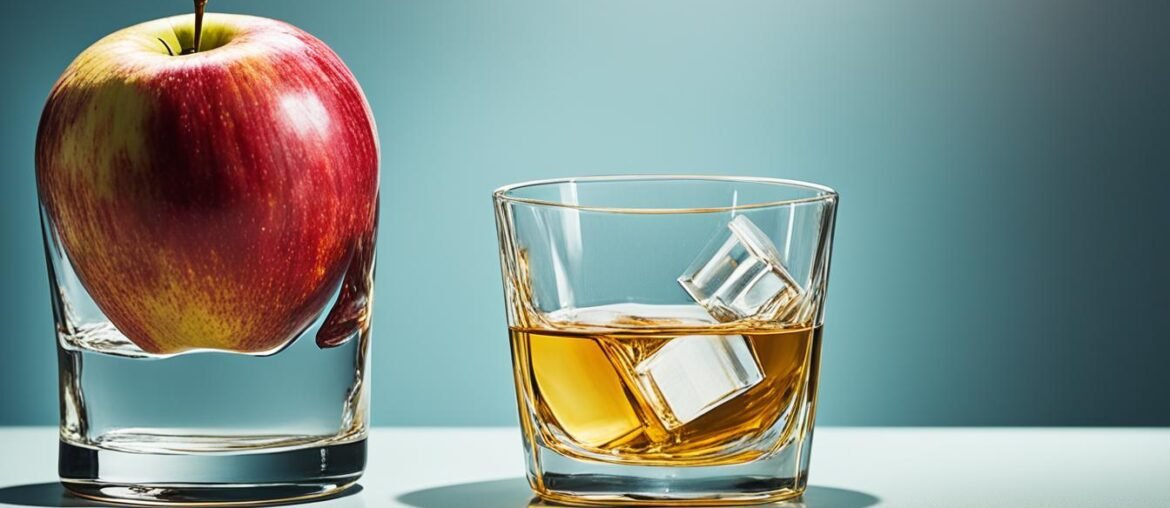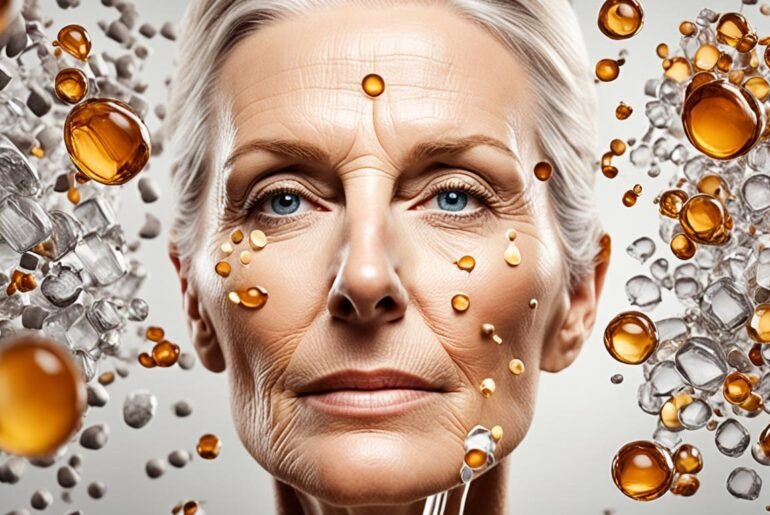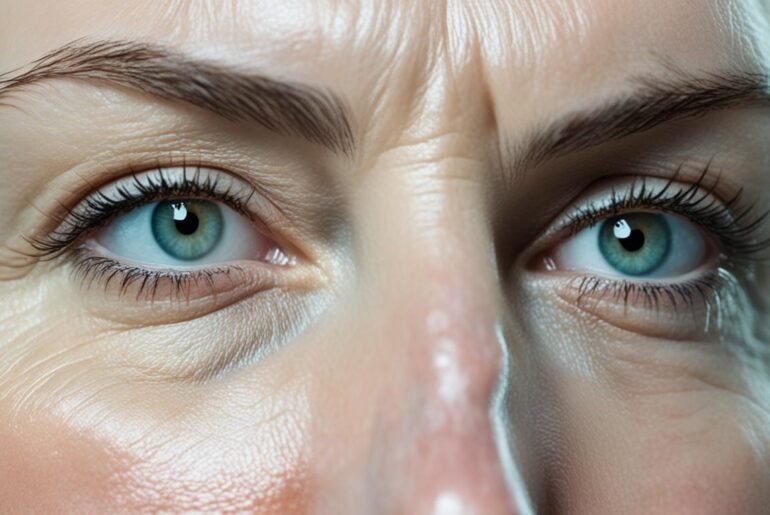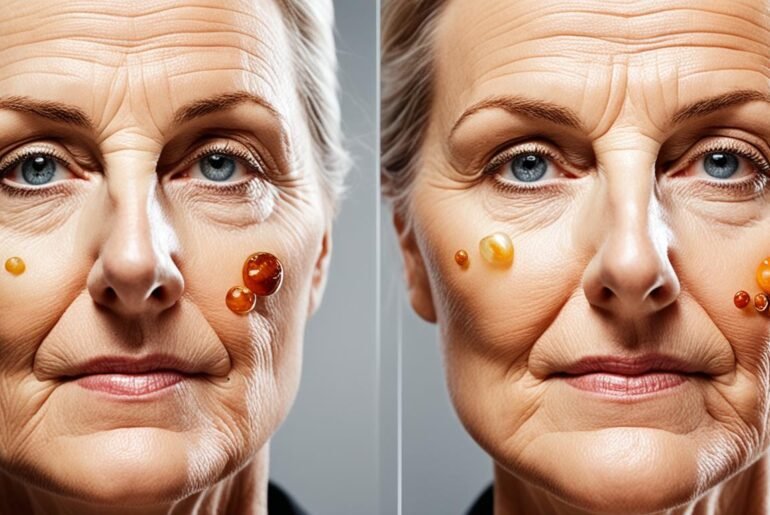Did you know that alcohol consumption can significantly impact the aging process of your skin? It turns out that indulging in alcoholic beverages can lead to a range of detrimental effects, from wrinkles and skin damage to dehydration and collagen depletion.
Alcohol’s impact on the skin goes beyond temporary effects like redness or puffiness. It can have long-lasting consequences that accelerate the signs of aging and diminish skin quality. Understanding these effects can help us make informed choices about our alcohol consumption and take steps to protect our skin’s health and appearance.
So let’s dive deeper into the relationship between alcohol consumption and skin aging and explore how alcohol can contribute to premature aging, fine lines, dehydration, collagen depletion, and overall skin damage.
Key Takeaways:
- Alcohol consumption can lead to increased wrinkles and skin damage.
- Dehydration is a common effect of alcohol on the skin, resulting in dryness and dullness.
- Collagen depletion caused by alcohol consumption can lead to sagging skin and loss of elasticity.
- Excessive alcohol consumption can impair the skin’s natural repair mechanisms and accelerate the signs of aging.
- Alcohol can negatively impact the overall quality and appearance of the skin, contributing to issues like acne and inflammation.
The Impact of Alcohol on Facial Aging
A large multinational study examined the effects of smoking and alcohol consumption on facial aging, revealing distinct differences between the two habits. While smoking was associated with increased severity of various facial lines and reduced lip fullness, heavy alcohol use demonstrated its own set of effects on facial aging.
“Smoking was associated with increased severity of forehead lines, crow’s feet, glabellar lines, under-eye puffiness, tear-trough hollowing, nasolabial folds, oral commissures, perioral lines, and reduced lip fullness.”
In contrast, heavy alcohol consumption was linked to distinct changes in facial appearance. One notable effect was the increase in upper facial lines, highlighting the impact of alcohol on facial wrinkles. Additionally, under-eye puffiness, oral commissures, midface volume loss, and visible blood vessels were more commonly observed among heavy alcohol users.
The Role of Tobacco Use and Volume-Related Aging
It’s important to note that facial aging is a complex process influenced by various factors beyond alcohol consumption alone. The study’s findings highlight the significance of other lifestyle habits, such as tobacco use, as well as volume-related aging, in contributing to the overall effects on facial appearance.
Comparing Effects on Facial Lines
To better understand the different impacts of smoking and alcohol on facial lines, let’s compare the notable findings:
| Facial Lines | Smoking | Alcohol Consumption |
|---|---|---|
| Forehead lines | Increased severity | – |
| Crow’s feet | Increased severity | – |
| Glabellar lines | Increased severity | – |
| Under-eye puffiness | Increased severity | More commonly observed |
| Tear-trough hollowing | Increased severity | – |
| Nasolabial folds | Increased severity | – |
| Oral commissures | Increased severity | More commonly observed |
| Perioral lines | Increased severity | – |
| Reduced lip fullness | Notable effect | – |
| Upper facial lines | – | Increased severity |
As shown in the table, smoking primarily contributes to an increased severity of forehead lines, crow’s feet, glabellar lines, under-eye puffiness, tear-trough hollowing, nasolabial folds, oral commissures, perioral lines, and reduced lip fullness. On the other hand, heavy alcohol use has a stronger association with increased upper facial lines, under-eye puffiness, oral commissures, midface volume loss, and visible blood vessels.
This image depicts the various types of facial lines commonly associated with facial aging.
Alcohol’s Dehydrating Effect on the Skin
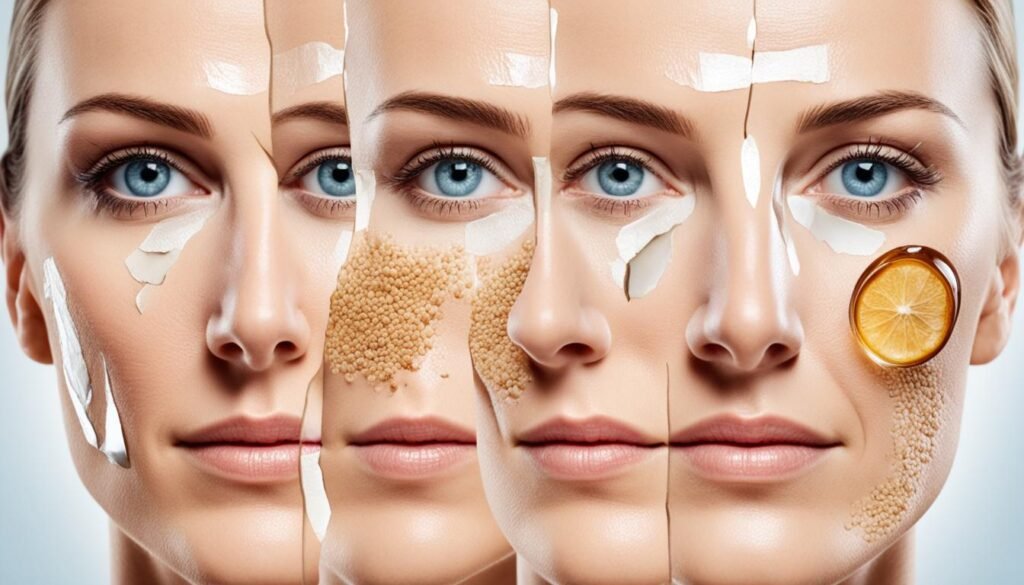
Alcohol consumption can have a significant impact on the hydration of our skin. When we consume alcohol, it can lead to skin dehydration due to its diuretic effect. This means that it increases urine production, causing our bodies to lose more fluids.
The loss of fluid in our bodies can directly affect the moisture levels in our skin, resulting in dry and dehydrated skin. When our skin is dehydrated, it may feel tight, rough, and lackluster. Furthermore, dehydration can contribute to the formation of wrinkles and fine lines, making our skin appear aged and less vibrant.
It’s important to note that the effects of alcohol on skin hydration can be even more pronounced if we consume alcohol excessively and do not properly hydrate ourselves. This is because prolonged and frequent alcohol consumption can hamper our body’s ability to retain water effectively.
As we lose more fluids due to alcohol consumption, our body’s natural processes to retain moisture are compromised. This can disrupt the barrier function of our skin, which normally helps to lock in moisture and protect against external factors that can contribute to skin dryness.
Excessive alcohol consumption can lead to dehydration in the skin, causing dryness, dullness, and an increased risk of wrinkles. Proper hydration is crucial for maintaining healthy and youthful-looking skin.
In order to mitigate the dehydrating effects of alcohol on the skin, it’s essential to practice moderation and engage in healthy habits. Drinking alcohol in moderation, alternating alcoholic beverages with water, and adequately hydrating ourselves throughout the day can help counter the dehydrating effects of alcohol on our skin.
| Effects of Alcohol on Skin Hydration |
|---|
| Dry and dehydrated skin |
| Tight and rough skin texture |
| Increased risk of wrinkles and fine lines |
| Dull and lackluster skin appearance |
By prioritizing hydration and minimizing alcohol consumption, we can promote optimal skin health and maintain a hydrated, youthful complexion.
Alcohol’s Impact on Collagen Depletion
Alcohol consumption can have damaging effects on the levels of collagen in the skin. Collagen is a vital protein responsible for maintaining skin elasticity and strength. When collagen levels are depleted, the skin becomes less firm and more susceptible to the formation of wrinkles and sagging.
Collagen depletion caused by alcohol consumption can accelerate the aging process and contribute to the visible signs of skin aging, including fine lines, wrinkles, and a loss of skin integrity. Additionally, compromised collagen levels can reduce the skin’s ability to heal and recover from damage, further exacerbating the effects of alcohol on skin health.
To illustrate the importance of collagen in supporting healthy skin, let’s take a closer look at a study conducted by researchers from the University of Manchester. The study examined the impact of alcohol on collagen synthesis in the skin. The results revealed a significant decrease in collagen production among individuals who consumed excessive amounts of alcohol compared to those who did not consume alcohol or consumed it in moderation. This decrease in collagen synthesis directly contributed to the accelerated aging and impaired skin quality observed in the alcohol-consuming group.
In summary, alcohol consumption can lead to collagen depletion in the skin, resulting in a loss of elasticity, increased susceptibility to wrinkles and sagging, and compromised skin health. It is important to be mindful of alcohol consumption to preserve collagen levels and maintain healthier, more youthful-looking skin.
Alcohol’s Contribution to Skin Damage
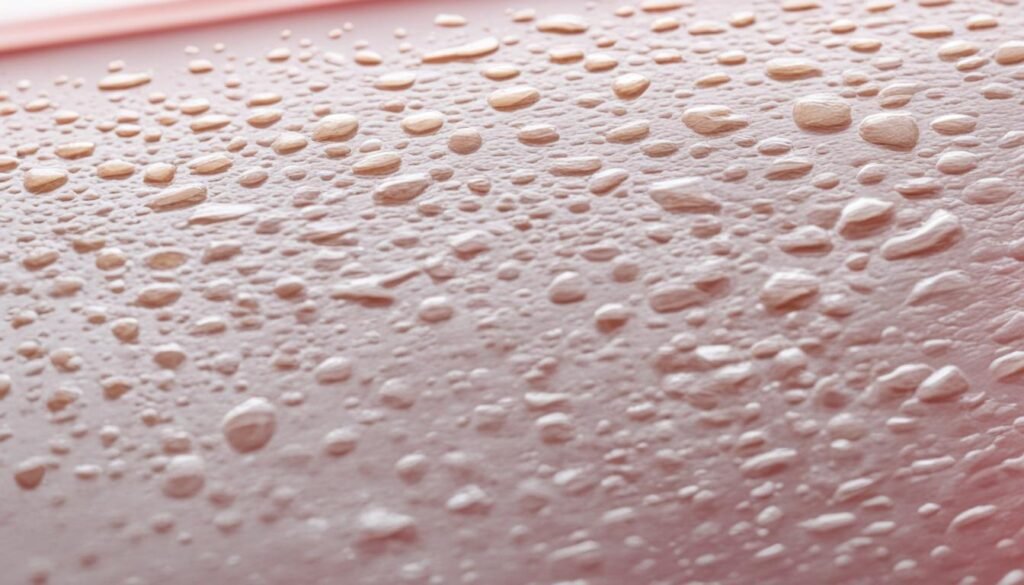
Excessive alcohol consumption can have detrimental effects on the health and appearance of the skin. Alcohol can impair the skin’s natural repair mechanisms and disrupt its delicate balance, leading to various forms of damage. Let’s explore how alcohol impacts the skin and why it is important to minimize its consumption.
The Effects of Alcohol on Skin Health
Alcohol’s impact on skin health is significant. One of the key ways alcohol can damage the skin is by reducing the turnover of collagen and elastin. These are essential proteins that provide structure, firmness, and elasticity to the skin. When the production and turnover of collagen and elastin are disrupted, the skin becomes more prone to premature signs of aging such as wrinkles, fine lines, and sagging.
Alcohol also has a direct effect on the skin’s blood vessels. It can cause cutaneous microvascular constriction and dilated facial capillaries, leading to visible redness and flushing. These visible effects can impair the skin’s overall health and appearance.
The Importance of Skin Repair Mechanisms
The skin has its own natural repair mechanisms that help maintain its health and integrity. These mechanisms include the production of new skin cells, the synthesis of collagen and elastin, and the protection against oxidative stress. However, excessive alcohol consumption can disrupt these repair mechanisms, inhibiting the skin’s ability to heal and recover from damage.
| Effects of Alcohol on Skin Damage: | Impact on Skin Health: |
|---|---|
| Reduces collagen and elastin turnover | Increases the risk of premature signs of aging |
| Causes blood vessel constriction and facial capillary dilation | Leads to visible redness and flushing |
| Disrupts skin’s natural repair mechanisms | Inhibits the skin’s ability to heal and recover |
Protecting the Skin from Alcohol-Related Damage
While avoiding alcohol completely may be challenging for some individuals, moderation is key when it comes to minimizing the damage to the skin. Reducing alcohol consumption and practicing healthy habits such as staying hydrated, following a balanced diet, and using skincare products that support skin health can help mitigate the negative effects of alcohol on the skin.
It is essential to prioritize the health and well-being of our skin by making conscious choices regarding alcohol consumption. By doing so, we can help maintain the skin’s natural functions, reduce the risk of premature aging, and promote a healthier, more vibrant complexion.
Alcohol’s Effect on Skin Quality
Alcohol consumption can have a negative impact on the overall quality of the skin. It can lead to various issues such as dullness, uneven tone, and the development of skin problems like acne and inflammation. The effects of alcohol on the skin’s antioxidant defense system can also contribute to a decrease in the skin’s overall health and radiance.
When we consume alcohol, it can cause dehydration in the skin, leading to dryness and a lack of moisture. This can give the skin a dull and lackluster appearance, making it lose its natural glow. Additionally, alcohol can disrupt the skin’s natural barrier function, making it more susceptible to environmental pollutants, UV damage, and inflammation.
Alcohol’s impact on the skin’s texture is also a concern. It can lead to an uneven skin tone, making it look patchy and discolored. This can be particularly noticeable in areas such as the cheeks and nose. The consumption of alcohol can also impair collagen production, which is responsible for maintaining the skin’s elasticity and firmness. As a result, the skin may appear less supple and more prone to sagging.
To illustrate the effects of alcohol on skin quality, let’s take a closer look at the following table:
| Effects of Alcohol on Skin Quality | Description |
|---|---|
| Dullness and Lack of Radiance | Alcohol dehydrates the skin, making it appear dull and lacking in radiance. |
| Uneven Skin Tone | Regular alcohol consumption can lead to an uneven skin tone, resulting in patches of discoloration. |
| Acne and Inflammation | Alcohol can trigger inflammation in the skin, leading to breakouts and aggravating existing skin conditions like acne. |
| Loss of Skin Elasticity | The depletion of collagen due to alcohol consumption can result in a loss of skin elasticity, causing it to sag and appear less firm. |
“Alcohol consumption can have detrimental effects on the quality and appearance of the skin. It can lead to dullness, unevenness in tone, and the development of skin problems such as acne and inflammation. Additionally, alcohol can interfere with the skin’s natural defense mechanisms and contribute to a decline in its overall health and radiance.”
Alcohol’s Contribution to Premature Aging
Excessive alcohol consumption can have a significant impact on the aging process of the skin. It not only accelerates the signs of aging but also exacerbates existing age-related skin changes, making them more pronounced. Several factors contribute to alcohol’s detrimental effects on premature aging.
The Effects of Alcohol on Aging
Alcohol consumption can lead to the development of wrinkles, fine lines, and loss of skin elasticity at a faster rate. The damaging effects of alcohol on the skin can be attributed to various factors such as:
- Dehydration: Alcohol is a diuretic that causes the body to lose fluids, leading to skin dehydration. This can result in dry and dull-looking skin, which can make wrinkles and fine lines more visible.
- Inflammation: Excessive alcohol consumption can trigger inflammation in the body, including the skin. Chronic inflammation can weaken the skin’s structure and impair its ability to regenerate, contributing to premature aging.
- Oxidative stress: Alcohol promotes the production of free radicals in the body, causing oxidative stress. Free radicals can damage skin cells, leading to collagen degradation and elastin breakdown, resulting in wrinkles and sagging skin.
Furthermore, alcohol can negatively affect the quality of sleep, disrupt hormonal balance, and impair the body’s ability to absorb essential nutrients. These factors can further accelerate the aging process and make the skin more susceptible to premature aging.
“Excessive alcohol consumption can accelerate the signs of aging such as wrinkles, fine lines, and loss of skin elasticity.”
Preventing Premature Aging Caused by Alcohol
Reducing or moderating alcohol consumption can help minimize the effects of premature aging. By adopting healthier lifestyle choices, such as drinking in moderation, staying well-hydrated, and practicing a consistent skincare routine, individuals can preserve the youthfulness and vitality of their skin.
It is important to note that everyone’s skin is unique, and the extent of alcohol’s impact on premature aging may vary. However, by making informed choices and taking proactive steps to care for the skin, individuals can maintain a youthful and healthy appearance despite the potential effects of alcohol.
| Effects of Alcohol on Premature Aging | How to Minimize Effects |
|---|---|
| Accelerates the development of wrinkles, fine lines, and loss of skin elasticity | Reduce or moderate alcohol consumption |
| Exacerbates existing age-related skin changes | Stay well-hydrated and practice a consistent skincare routine |
| Causes skin dehydration, leading to dry and dull-looking skin | Drink plenty of water and use hydrating skincare products |
| Promotes inflammation and oxidative stress, damaging skin cells | Adopt an anti-inflammatory diet rich in antioxidants |
Alcohol’s Impact on Fine Lines

Alcohol consumption can have significant effects on the development of fine lines on the skin. One of the primary ways alcohol contributes to the formation of fine lines is through skin dehydration. Alcohol depletes the skin’s moisture levels, impairing its ability to retain hydration. This can result in dry and parched skin, which is more prone to the appearance of fine lines and wrinkles.
Furthermore, alcohol’s impact on collagen depletion further exacerbates the development of fine lines. Collagen is a vital protein that provides structure and elasticity to the skin. When alcohol is consumed excessively, it can deplete collagen levels, leading to a loss of skin firmness and elasticity. This degradation in collagen quality can cause fine lines to become more noticeable and prominent.
In order to prevent and minimize the appearance of fine lines, it is essential to reduce alcohol consumption. Hydrating the skin through a proper skincare routine, including moisturizing products and drinking plenty of water, is crucial. Additionally, incorporating collagen-boosting ingredients such as retinol and peptides into your skincare routine can help improve skin elasticity and mitigate the formation of fine lines.
The Effects of Alcohol on Fine Lines: Key Points
- Alcohol consumption dehydrates the skin and impairs its ability to retain moisture.
- Dehydrated skin is more prone to the development of fine lines and wrinkles.
- Alcohol’s impact on collagen depletion can further contribute to the appearance of fine lines.
- Reducing alcohol consumption and maintaining proper hydration can help prevent and minimize the formation of fine lines.
| Effects of Alcohol on Fine Lines | Prevention and Mitigation |
|---|---|
| Dehydration of the skin | Maintain proper hydration through skincare and drinking ample water |
| Collagen depletion | Incorporate collagen-boosting ingredients into skincare routine |
| Enhanced visibility of fine lines | Reduce alcohol consumption and adopt a healthy lifestyle |
Alcohol’s Link to Skin Dehydration
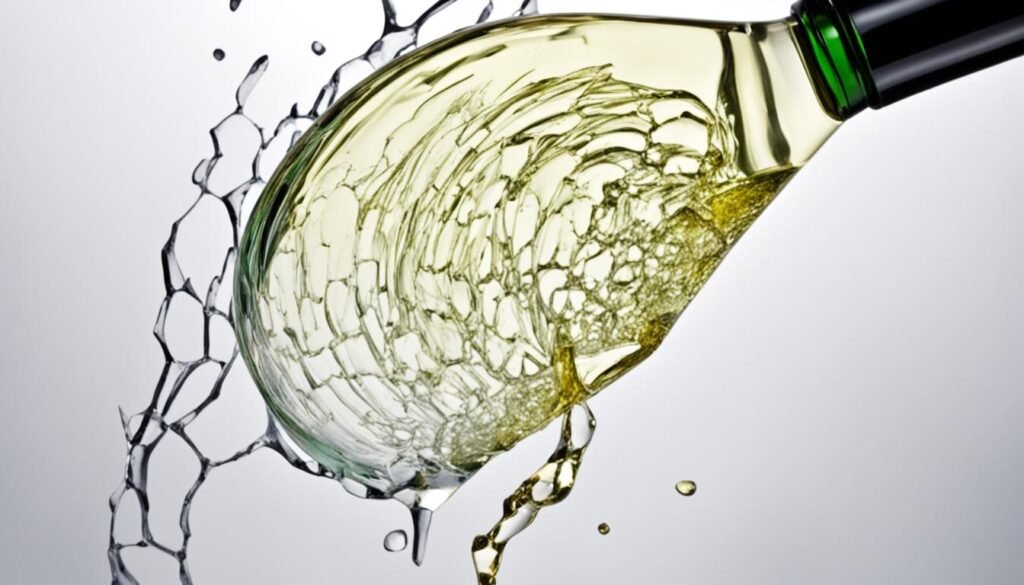
Alcohol consumption can have a significant impact on the moisture levels of the skin, causing dehydration and contributing to various skin concerns. When you consume alcohol, it reduces the skin’s moisture content, leading to dryness and a higher susceptibility to irritation. The resulting skin dehydration can manifest as dullness, rough texture, and an increased likelihood of developing wrinkles and other signs of aging.
Dehydrated skin not only looks lackluster, but it also compromises the skin’s barrier function, making it more vulnerable to external aggressors. The loss of moisture can disrupt the skin’s natural balance, leading to imbalances in oil production and potential breakouts. In addition, dehydrated skin may exacerbate existing skin conditions and make them more challenging to manage.
In order to maintain optimal skin health, it is crucial to address the dehydration caused by alcohol consumption. By adopting a comprehensive skincare routine that focuses on hydration, you can counteract the effects of alcohol on your skin. Incorporating products containing hydrating ingredients such as hyaluronic acid can help restore moisture levels and enhance the overall appearance and resilience of your skin.
A balanced and holistic approach to skincare, combined with moderate alcohol consumption or abstinence, can help mitigate skin dehydration and promote a healthier complexion. It is essential to prioritize hydration, both internally and externally, to counteract the detrimental effects of alcohol on skin moisture.
Remember, maintaining a well-hydrated skin not only contributes to a more youthful and vibrant appearance but also supports its overall health and functionality.
| Effects of Alcohol on Skin Moisture | Consequences |
|---|---|
| Dryness and rough texture | Can result in a dull and lackluster appearance |
| Increased susceptibility to irritation | May lead to redness, sensitivity, and discomfort |
| Development of wrinkles and fine lines | Dehydrated skin is more prone to premature aging |
| Compromised skin barrier function | Leads to a higher risk of inflammation and infections |
| Exacerbation of existing skin conditions | Can worsen acne, eczema, and other skin concerns |
Alcohol’s Role in Collagen Depletion
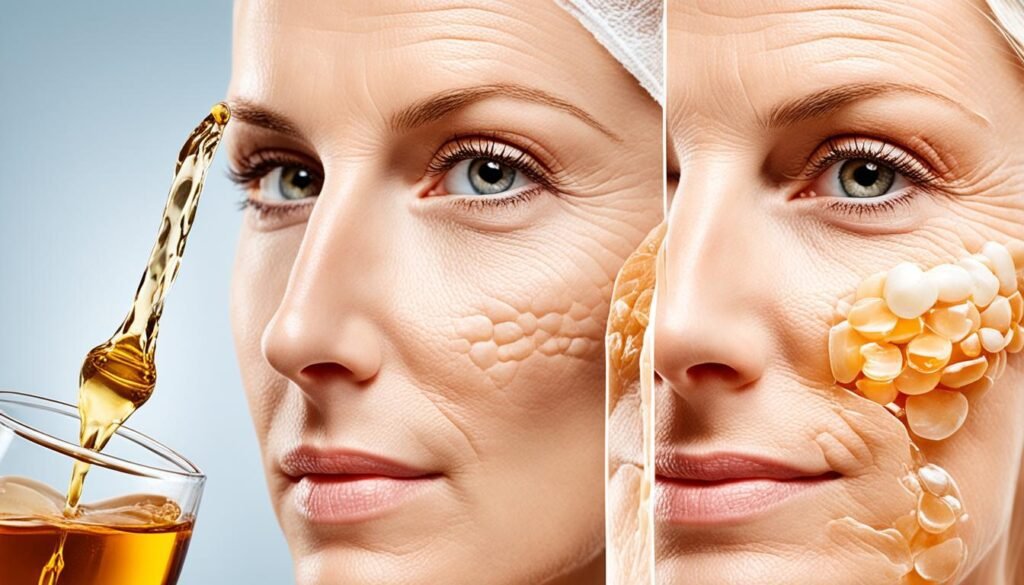
Alcohol consumption can have detrimental effects on the production and maintenance of collagen in the skin. Collagen is a protein that provides structure, strength, and elasticity to the skin. When collagen levels are depleted, the skin becomes less firm and resilient, leading to the development of wrinkles and sagging.
Research has shown that alcohol inhibits collagen synthesis, the process of creating new collagen in the body. This can result in a decrease in collagen production, leaving the skin more susceptible to the visible signs of aging. Alcohol also affects the enzymes responsible for collagen degradation, further contributing to collagen depletion.
Alcohol consumption can lead to a disruption in the balance between collagen production and degradation, ultimately leading to collagen deficiency in the skin.
Furthermore, alcohol can impair the body’s ability to absorb and utilize essential nutrients required for collagen synthesis, such as vitamin C and copper. These nutrients play a crucial role in the formation and maintenance of collagen fibers in the skin.
The Effects of Alcohol on Collagen Depletion
The impact of alcohol on collagen depletion in the skin can be significant and contribute to various skin concerns:
- Increased Wrinkles: Collagen depletion weakens the skin’s structure, making it more prone to the formation of fine lines and wrinkles.
- Sagging Skin: Reduced collagen levels result in a loss of skin firmness and elasticity, leading to sagging and drooping.
- Loss of Skin Volume: Collagen plumps up the skin, giving it a youthful and revitalized appearance. Alcohol-induced collagen depletion can lead to a loss of volume, making the face appear hollow or sunken.
- Delayed Wound Healing: Collagen is essential for the healing process of wounds. Alcohol’s impact on collagen production and degradation can delay the healing of skin injuries.
It is important to note that collagen depletion caused by alcohol consumption is a gradual process that occurs over time with prolonged and excessive drinking. However, even moderate alcohol intake can contribute to collagen degradation and accelerate the aging process.
| Effects of Alcohol on Collagen Depletion | Impact |
|---|---|
| Increased Wrinkles | Weakens skin structure, leading to the formation of fine lines and wrinkles. |
| Sagging Skin | Reduces skin firmness and elasticity, resulting in sagging and drooping. |
| Loss of Skin Volume | Leads to a loss of facial volume, creating a hollow or sunken appearance. |
| Delayed Wound Healing | Impairs the healing process of wounds due to collagen deficiency. |
By understanding the link between alcohol consumption and collagen depletion, individuals can make informed choices about their drinking habits and take steps to minimize the negative effects on their skin. Reducing alcohol intake, staying hydrated, and adopting a healthy lifestyle can help support collagen production and maintain skin firmness and resilience.
Conclusion
Excessive alcohol consumption can have detrimental effects on the aging of the skin. It can lead to increased wrinkles, dehydration, collagen depletion, and a decline in skin quality. Alcohol’s impact on the skin’s hydration levels can result in dryness and the formation of fine lines and wrinkles. Collagen, which is essential for maintaining skin elasticity and firmness, can be depleted by alcohol consumption, leading to sagging and a loss of skin’s youthful appearance.
Furthermore, alcohol can impair the skin’s natural repair mechanisms and reduce the turnover of collagen and elastin, accelerating the signs of aging. It can also contribute to skin damage, such as visible blood vessels and cutaneous microvascular constriction. Additionally, alcohol consumption can lead to uneven skin tone, acne, and inflammation, affecting the overall quality and texture of the skin.
To maintain skin health and appearance, it is important to consider reducing or moderating alcohol consumption. By doing so, individuals can protect their skin from the negative effects of alcohol, helping to maintain a healthier and more youthful appearance in the long term.
FAQ
What are the effects of alcohol consumption on skin aging?
Alcohol consumption can lead to increased wrinkles, skin damage, dehydration, premature aging, and a depletion of collagen, which affects the skin’s elasticity.
How does alcohol impact facial aging?
Heavy alcohol use is associated with increased upper facial lines, under-eye puffiness, oral commissures, midface volume loss, and visible blood vessels.
Does alcohol dehydrate the skin?
Yes, alcohol consumption can cause dehydration in the skin, leading to dry and dehydrated skin, which can contribute to the formation of wrinkles and a dull appearance.
Does alcohol affect collagen levels in the skin?
Yes, alcohol consumption can deplete collagen levels in the skin, leading to less firmness and increased wrinkles and sagging.
How does alcohol contribute to skin damage?
Excessive alcohol consumption can impair the skin’s natural repair mechanisms, reduce collagen turnover, and cause cutaneous microvascular constriction and dilated facial capillaries, which can damage the skin.
Does alcohol impact the quality of the skin?
Yes, alcohol can make the skin look dull, uneven in tone, and contribute to the development of skin issues such as acne and inflammation. It can also decrease the skin’s overall health and radiance.
Can alcohol contribute to premature aging of the skin?
Yes, alcohol consumption can accelerate the signs of aging, such as wrinkles, fine lines, and loss of skin elasticity. It can also exacerbate existing age-related skin changes.
How does alcohol affect the development of fine lines?
Alcohol consumption can dehydrate the skin and impair its ability to retain moisture, leading to the formation of fine lines and wrinkles.
Does alcohol cause skin dehydration?
Yes, alcohol consumption can cause skin dehydration, resulting in dry skin that is more prone to irritation and the development of wrinkles and other signs of aging.
Does alcohol contribute to collagen depletion in the skin?
Yes, alcohol consumption can lead to collagen depletion, which affects the skin’s firmness and resilience, leading to the development of wrinkles and sagging.
How can I protect my skin from the negative effects of alcohol consumption?
By reducing or moderating alcohol consumption, individuals can help protect their skin and maintain a healthier and more youthful appearance.

